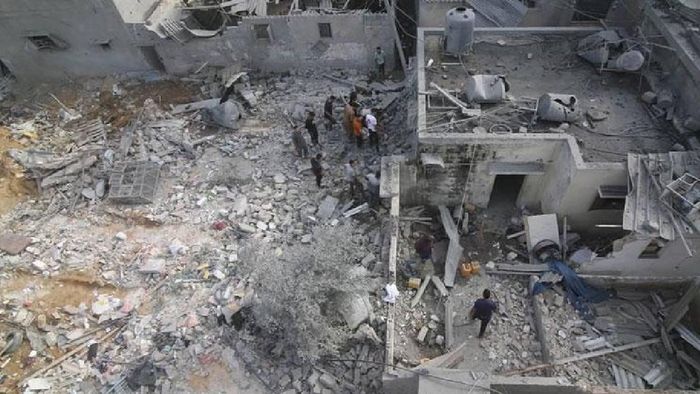Israeli military discovers 1,500 bodies of Hamas operatives as control restored in the South
In a recent development, Israeli military has reportedly discovered 1,500 bodies of Hamas operatives in the southern region. Further details are yet to be disclosed.

- Oct 10, 2023,
- Updated Oct 10, 2023, 6:08 PM IST
The Israeli military announced the discovery of approximately 1,500 bodies of Hamas militants within Israeli territory, coinciding with their declaration of having gained effective control in the southern region and "restored full control" over the border. The revelation raises questions about whether these numbers overlap with previous death toll figures reported by Palestinian authorities.
Spokesperson Richard Hecht confirmed that no Hamas fighters had crossed into Israeli territory since the previous night, although the possibility of further infiltrations remains a concern.
Israeli warplanes unleashed a relentless barrage on downtown Gaza City, which serves as Hamas' centers of government, continuing into early Tuesday. This escalation comes in response to Israeli Prime Minister Benjamin Netanyahu's promise of retaliation against the Islamic militant group, vowing actions that would "reverberate for generations."
The four-day-old conflict has already resulted in a devastating death toll, with at least 1,600 lives lost. Israel has witnessed gun battles in its streets, a rarity in recent decades, while neighborhoods in Gaza have been reduced to rubble. In a dangerous escalation, Hamas has also pledged to kill captured Israelis if Israeli strikes target civilians without warning.
Israel has reported that Hamas and other militant groups in Gaza are currently holding over 150 soldiers and civilians abducted from within Israel following the initial attack, which caught the Israeli military and intelligence apparatus off guard.
As the Israeli military mobilizes 300,000 reservists in a massive deployment, a critical question arises about the possibility of a ground assault into the densely populated Gaza Strip. The last ground assault took place in 2014.
In response to the mounting threats, thousands of Israelis have been evacuated from more than a dozen towns near Gaza. Tanks and drones have been deployed to guard breaches in the Gaza border fence against potential incursions. Meanwhile, in Gaza, tens of thousands have fled their homes as airstrikes continue to level buildings.
These developments, coupled with Israel's formal declaration of war on Sunday, signal a shift towards an offensive stance against Hamas, raising concerns of further devastation in the impoverished Gaza Strip.
"We have only started striking Hamas," asserted Israeli Prime Minister Benjamin Netanyahu in a nationally televised address. "What we will do to our enemies in the coming days will reverberate with them for generations."
The Israeli military has reported striking hundreds of Hamas targets in Gaza's City Rimal neighborhood, which houses key Hamas ministries and governmental structures, during overnight operations.
Regarding civilian safety, Hecht mentioned that Gazans have been informed of evacuation instructions "over social media" before airstrikes but did not provide specific details.
On October 9 , Israel made a grim discovery, finding more bodies stemming from Hamas' audacious weekend attack on southern Israeli towns. Rescue workers uncovered 100 bodies in the small farming community of Be'eri, representing approximately 10% of its population, following a protracted hostage standoff with gunmen.
The death toll on both sides is staggering, with the Israeli military reporting over 900 casualties in Israel and authorities in Gaza and the West Bank confirming 704 deaths. Israel contends that many of these casualties include Hamas fighters, while thousands on both sides have been wounded.